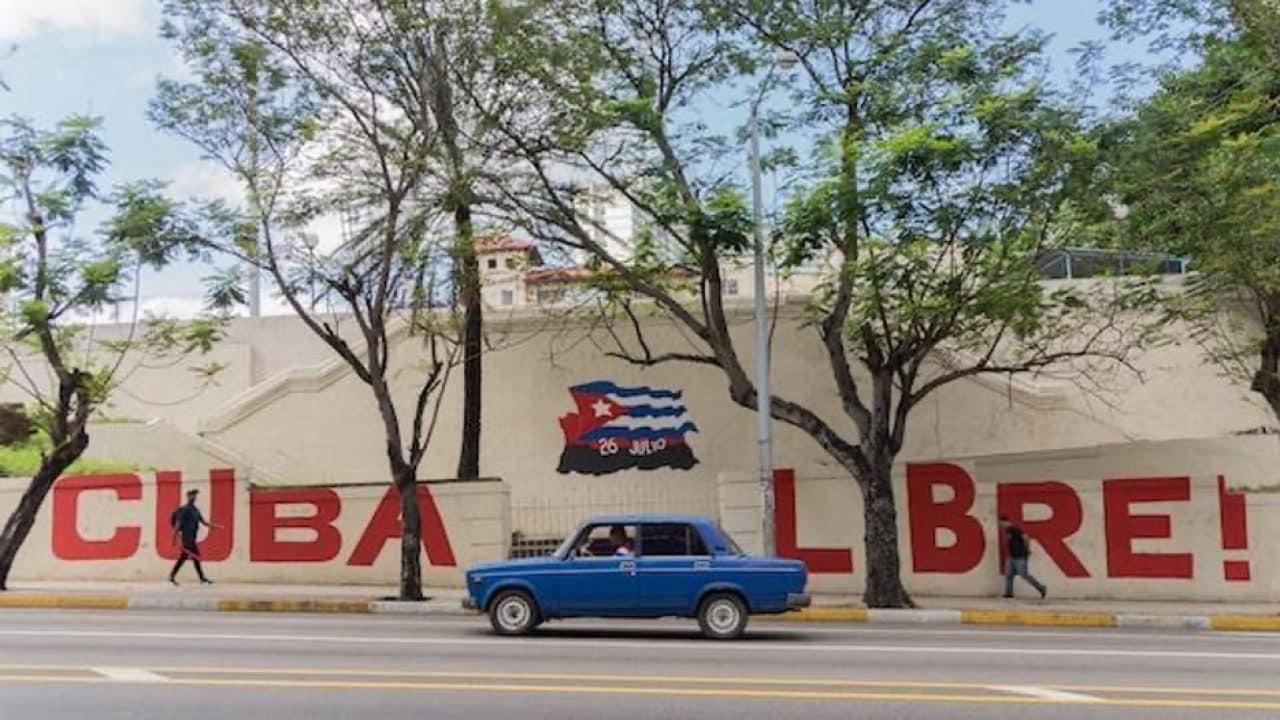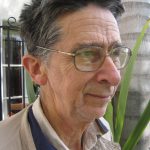
A person and a driver passing by a graffiti that says "Cuba Libre". Photo: Yerson Olivares.

Orinoco Tribune – News and opinion pieces about Venezuela and beyond
From Venezuela and made by Venezuelan Chavistas

A person and a driver passing by a graffiti that says "Cuba Libre". Photo: Yerson Olivares.
By W.T. Whitney Jr. – Nov 8, 2022
For the thirtieth consecutive year nations of the world have voted overwhelmingly to approve a Cuban resolution calling for an end to the U.S. economic blockade. The most recent vote, on November 3, had 185 nations favoring the resolution, the United States and Israel opposing, and Ukraine and Brazil not voting.
Cuba has withstood the blockade for 60 years, a duration equal to one-fourth of the years of U.S. national existence. Cuba has lacked the resources and powerful allies that would have been necessary to force the U.S. government to backtrack.
Cuba has relied on ideals, high principles, and supportive consensus, as epitomized by the yearly votes in the General Assembly. These majorities have attested to the blockade’s cruelty, immorality, unfairness, and illegality under international law. An opportunistic and powerful U.S. ruling class does not budge.
The U.S. blockade won’t end soon because the Helms Burton Law of 1996 put that decision into the hands of Congress, where U.S. policy on Cuba is on automatic pilot. The blockade might disappear if outcomes envisioned by U.S. State Department official Lester Mallory in April 1960 have their intended effect. The U.S. government regards the blockade as a tool for achieving “economic dissatisfaction and hardship,” “hunger,” “desperation,” and “overthrow of government.”
All but the last of these policy goals are being realized. What follows here is a look at U.S. methods, testimony from Cuba, and evidence provided by the Cuban president that corruption is accentuating. Pervasive corruption, assumed to be the product of desperation and destabilization, may signal that crisis is at hand in Cuba.
Disruption
At a press conference on October 19, Cuban foreign minister Bruno Rodríguez explained operational aspects of the blockade leading to the Mallory results. He noted that Cuba had suffered the loss between August 2021 and February 2022 of $3.8 billion, which “is a historical record for such a short time.” Losses over six decades amount to $154 billion. With inflation, that’s $1.39 trillion.
The U.S. government designates Cuba as a terrorist-sponsoring nation. That means foreign companies and financial institutions face severe U. S. penalties if they handle dollars in transactions with Cuba. Dollars are the principal currency used in international monetary transactions. As a result, Cuba’s income from exports is reduced and international loans are largely unavailable.
Without much money to pay for imports, Cuba experiences shortages of food, spare parts, raw materials for drug manufacture, and all kinds of supplies and equipment. Rodríguezmentioned long lines and “anxiety among the population.” The blockade affects “every Cuban family” and the government cannot “guarantee medicines that an ill person requires.”
“Cuba can in no way … buy technologies, equipment, spare parts, digital technologies or software containing more than 10 per cent US components.” Other difficulties aggravate adverse blockade effects, among them: inflation, hurricane damage, lingering effects of the Covid-19 pandemic, and fire recently at oil storage facilities in Matanzas that decimated fuel reserves.
Blockade restrictions “gravely hinder our fuel purchases by making them … [up to] 50 percent more expensive.” Electrical power generation “is going through an extremely serious situation” because of unavailable replacement parts. Blackouts bedevil Cubans every day and restoration of electrical power in hurricane-damaged Pinar del Rio has been slow.
First hand report
Richard Grassl, friend and political colleague, visited Cuba recently with his wife, who is Cuban. He recalls conversations touching on shortages, distress, and uncertainty as to who or what is responsible.
10/16 Talked to first cousin of wife … He told me I will learn the real Cuba this time. He says not to believe what the Cuban government says about the US blockade. There are many lies. My wife’s nephew says the economy is “nothing. Many Cubans think the blockade [itself] is secondary to issues of daily living like [shortages of] food, medicine, water and lack of opportunity because there is no money.
10/17 I asked him from where most food for Cubans comes from and about food imports. He said most food comes from Miami. [President] Diaz-Canel gets some blame for the situation.
10/18 There is not much social distancing as the times are urgent. Food, consumer goods, fuel, construction materials are very expensive. Eggs are $8USD / dozen. The exchange rate is 80 CUP / USD which is 4x higher than before Covid-19. No one talks about the blockade. The problem is scarcity of money.
10/19 I talked with a friend. He says the US has so much and we have so little. He asks why cannot there be trade? … At several bodegas and public markets, many people, perhaps hundreds, waited all day for cooking oil, rice, beans, chicken etc. at prices subsidized by government.
10/20 I talked to another cousin from Matanzas who said the economy is “on the floor”. It is very hard with little money. A round trip from Matanzas to Havana (500 km) was $500 CUP/person one way or $2000 round trip for both persons by bus.
Corruption and blockade
Former Cuban President Fidel Castro delivered a wide-ranging speech on November 17, 2005 notable for highlighting corruption: “This country can self-destruct; this Revolution can destroy itself, but they can never destroy us; we can destroy ourselves, and it would be our fault.”
Similarly, President Miguel Díaz-Canel on October 26 convoked a meeting of Cuba’s Council of Ministers at which a plan was unveiled with “more than 40 directives aimed at confronting crime, corruption, and lack of social discipline.” The report appearing on the presidential website characterized the President’s remarks as “a forthright analysis of illegalities, stealing and price-gouging imposed on a population with no economic means.”
Both earlier and now, the toxic mixture of shortages of goods and money has led to stealing and lawlessness. It’s a destabilizing process entirely consistent with how the blockade was supposed to operate. President Díaz-Canel’s words are useful here for documenting the existence and reach of corruption.
He explained to the Council that, “neither the Party or the government can remain on the sidelines of what’s happening in society.” Therefore, “we must not allow those who neither work nor contribute, and are beyond the law, to acquire more and have more possibilities for life than do those who actually contribute. We have it backwards now and are breaking with the ideas of socialism.”
President Maduro Celebrates Cuba’s Victory at United Nations
Díaz-Canel pointed out that, “Many of these things are the result of us not attending to the powers and responsibilities assigned to our institutions.” [Corrupt activities] “take place in full view of the Party centers, the administrative institutions, and leadership bodies.”
The President asserted that anyone able to work who is not doing so is not so vulnerable as to require “welfare assistance.” In fact, “the building of socialism does not depend upon a welfare system. What we have to seek out, instead, is social transformation.”
Díaz-Canel observed that, “We don’t do away with taxes here so that the rich get richer and poorer people have less. Here, we do have taxes so that those who have more give something up so that those who have less are better off.” “That’s socialism,” he explained.
While celebrating another Cuban victory in the UN General Assembly, supporters of revolutionary Cuba, we think, ought to recognize that
the survival of Cuba’s government is now at unprecedented risk, thanks to the U.S. blockade. U.S. supporters of Cuba’s revolutionary project would do well to elevate actions of resistance against their own government to a new level, with new intensity. That’s because realities in Cuba appear to have altered, ominously so.
Already new mobilization may be underway. In the days prior to the General Assembly’s vote on November 3, dozens of rallies for ending the blockade took place in cities and towns throughout the United States (two of them in Maine, the author’s home state), with particularly big ones in Los Angeles, Portland Oregon; and New York. There, an impressive march took place between Times Square and the United Nations Plaza. ,

W.T. Whitney Jr. grew up on a dairy farm in Vermont and now lives in rural Maine. He practiced and taught pediatrics for 35 years and long ago joined the Cuba solidarity movement, working with Let Cuba Live of Maine, Pastors for Peace, and the Venceremos Brigade. He writes on Latin America and health issues for the People's World.